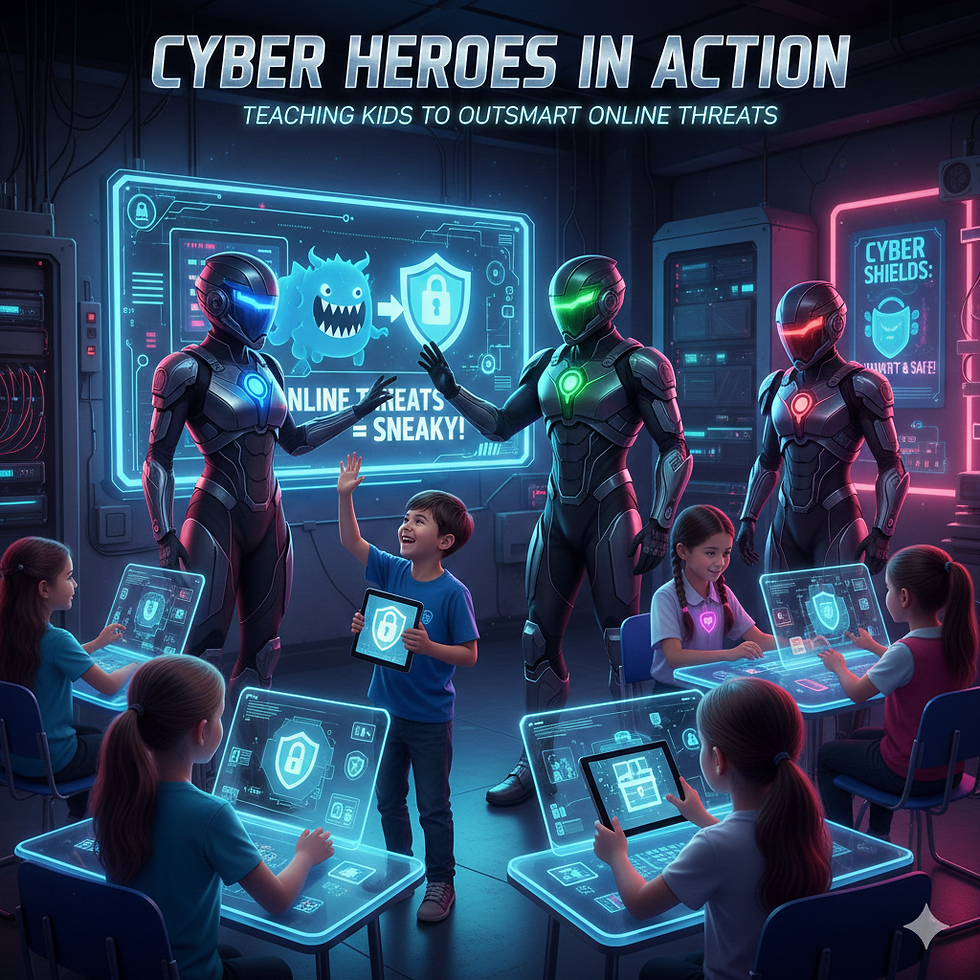How Can Schools and PTAs Utilize the Cyber Heroes Framework to Foster Responsible Digital Citizenship?
- Valarian Couch
- Apr 25, 2025
- 4 min read
In today's digital age, where technology is interwoven into the fabric of everyday life, it is imperative for educational institutions to equip students with the knowledge and skills necessary to navigate the online world responsibly. The rise of the digital landscape brings both opportunities and challenges, making the role of educators and parents more crucial than ever.
This article explores how schools and Parent-Teacher Associations (PTAs) can integrate the Cyber Heroes framework into their digital safety programs, fostering responsible digital citizenship among students. By implementing this framework, schools can create a safe and nurturing environment that empowers students to become savvy users of digital tools.
Understanding Digital Citizenship
Digital citizenship refers to the norms of appropriate and responsible behavior with regard to technology use. It encompasses a range of skills necessary for navigating the digital landscape, including online etiquette, privacy management, and critical thinking.
With the increasing use of mobile devices and the internet, students must be taught how to interact respectfully and responsibly online. This education not only protects them from potential risks but also prepares them to participate effectively in the digital world.
The Cyber Heroes Framework Explained
The Cyber Heroes framework is designed to provide schools with structured resources and guidelines for promoting digital citizenship. It encompasses five key areas: online safety, digital literacy, ethical use of technology, empathy and respect, and proactive engagement.
Online Safety: Schools can educate students about protecting their personal information and staying safe from cyberbullying and other online threats.
Digital Literacy: This involves teaching students how to critically evaluate online content, discern reliable sources from misinformation, and understand the impact of their digital footprints.
Ethical Use of Technology: Students should learn the importance of using technology responsibly, respecting others' rights, and understanding the implications of their online actions.
Empathy and Respect: Fostering empathy helps students understand the feelings of others and promote a positive digital culture.
Proactive Engagement: Encouraging students to take an active role in their online communities encourages responsible behavior and empowers them to stand against undesirable conduct.
By focusing on these five essential areas, schools can ensure that students not only understand the basics of digital citizenship but also develop a strong moral compass guiding their online behavior.
The Role of Schools and PTAs in Implementing the Cyber Heroes Framework
Both schools and PTAs play a crucial role in incorporating the Cyber Heroes framework into their digital safety programs. Here are some practical steps they can take:
Collaboration and Training
Schools should collaborate with PTAs to create a unified approach to digital citizenship education. Training sessions for parents, teachers, and students on topics such as online safety and digital ethics can be organized to ensure everyone is on the same page.
Curriculum Integration
Schools can integrate the Cyber Heroes framework into existing curricula, making digital citizenship a part of regular lessons. For instance, using real-life scenarios and simulations can help students understand the consequences of poor digital behavior.
Workshops and Events
Organizing workshops, seminars, and events where experts discuss various aspects of digital safety can enhance the awareness of both students and parents. Inviting guest speakers from local communities can provide practical insights and inspire students to engage with digital tools responsibly.
Resource Sharing
Educators and parents can benefit from sharing digital resources, such as articles, videos, and online courses, that pertain to the Cyber Heroes framework. By providing a toolkit of resources, schools and PTAs can equip families with the tools they need to foster responsible digital citizens at home.
Community Engagement
Encouraging parents and community members to participate in discussions around digital citizenship strengthens the partnership between schools and families. This collaborative effort fosters a sense of responsibility within the community to promote positive digital behavior.
Benefits of Embracing the Cyber Heroes Framework
Implementing the Cyber Heroes framework can yield numerous benefits for schools, students, and the community at large:
Enhanced Knowledge and Skills
By prioritizing digital citizenship education, students become more knowledgeable about online risks and how to protect themselves, thereby enhancing their overall digital literacy.
Positive School Culture
A focus on empathy and respect within the Cyber Heroes framework contributes to a more positive school culture. When students learn to interact respectfully online, it creates a supportive community.
Preparedness for the Future
As technology continues to evolve, equipping students with the skills and knowledge to navigate the digital world prepares them for future challenges. They will be better prepared to engage with emerging technologies and trends.
Stronger Parent-School Relationships
Collaborative efforts between schools and PTAs not only strengthen relationships but also foster a greater sense of responsibility among parents for their children’s digital behavior.
Conclusion
As the digital landscape continues to evolve, the responsibility of guiding students towards becoming responsible digital citizens falls on both schools and PTAs. By integrating the Cyber Heroes framework into existing digital safety programs, educational institutions can provide students with the necessary skills and knowledge to navigate the online world safely and responsibly.
The journey towards fostering responsible digital citizenship is ongoing and requires consistent effort from all stakeholders. Through collaboration, education, and proactive engagement, schools and families can work together to build a future where students are not just consumers of digital content, but empowered and responsible digital citizens.

This guide aims to encourage schools and PTAs to take initiative, adapt the Cyber Heroes framework, and cultivate an environment where educational achievement and digital responsibility go hand in hand. It's essential for the safety and success of our students today and into the future.
.jpg)




Comments